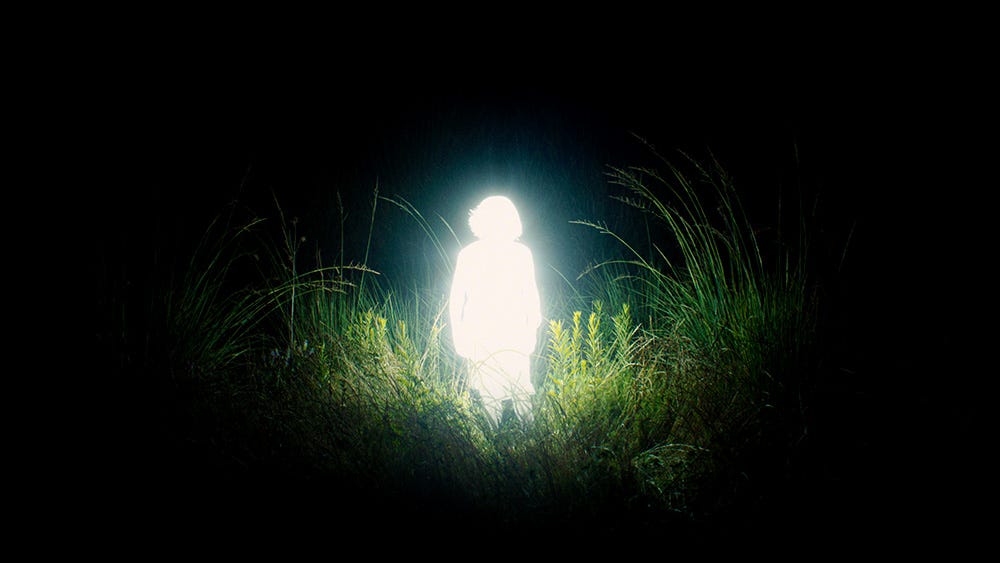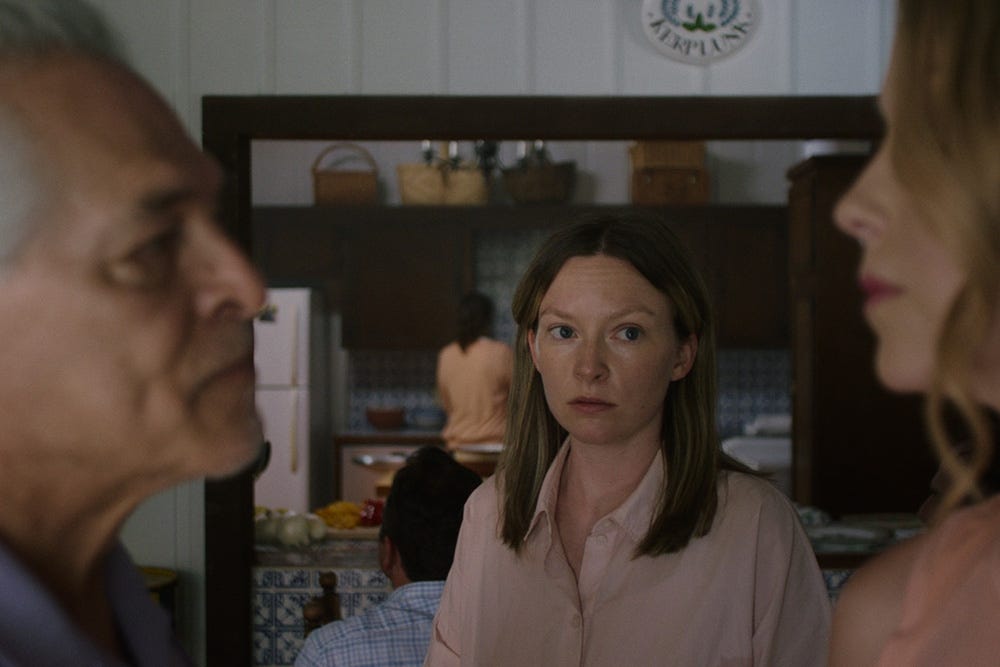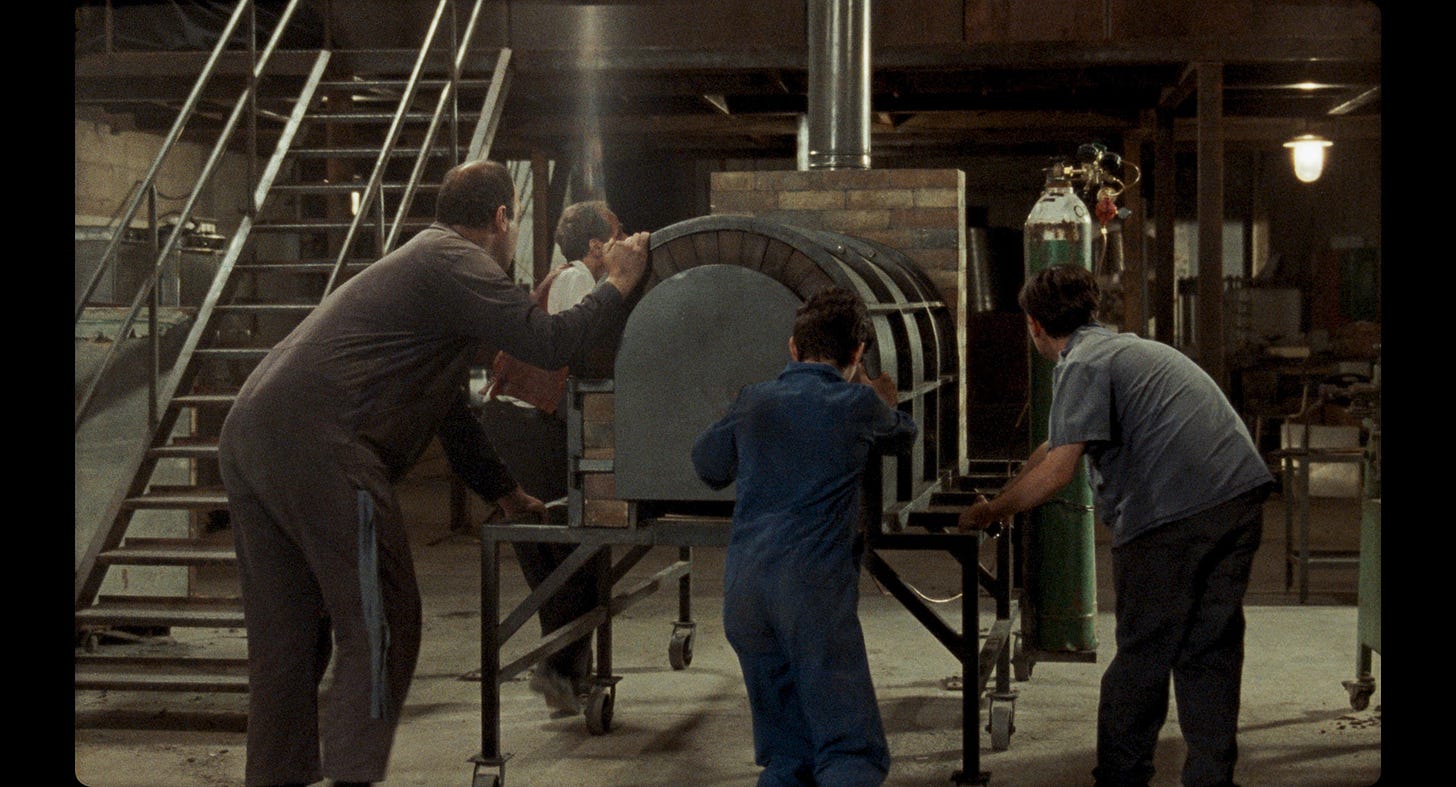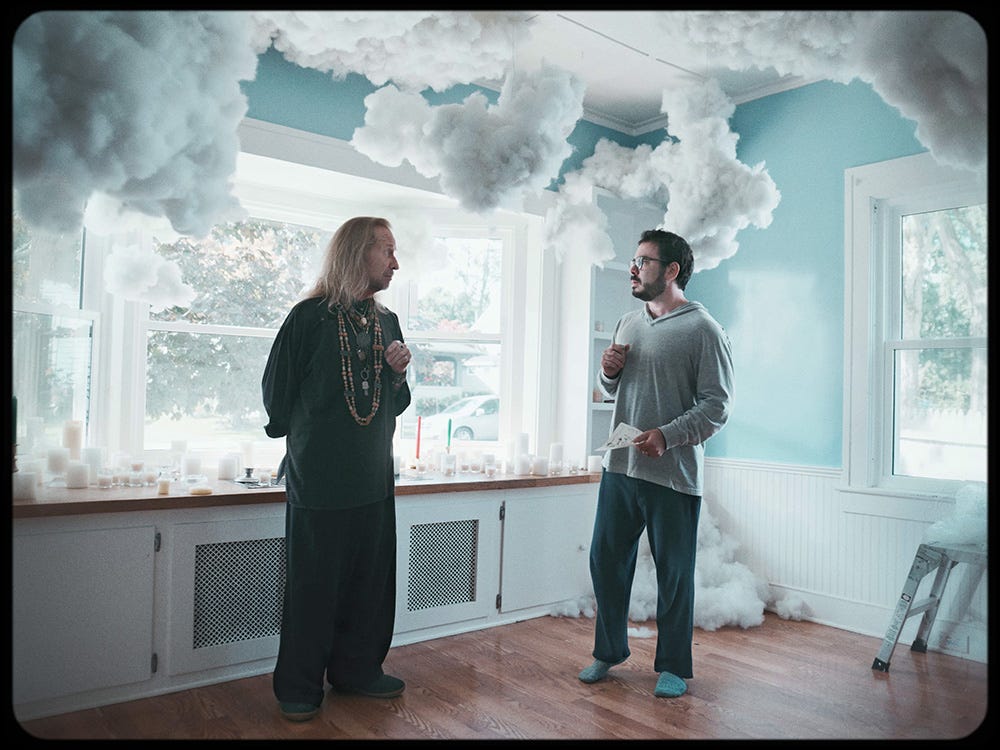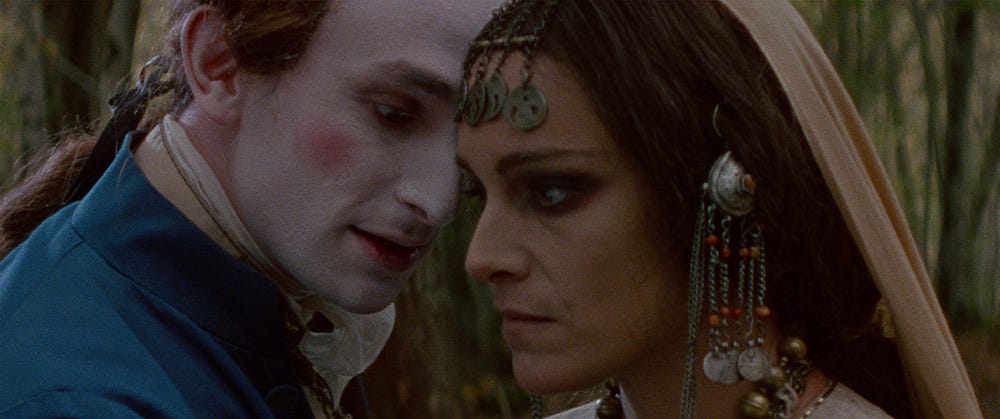Happy THE BEAR week to those who celebrate!
Tough to be a fan of a popular show these days as spoilers abound. I’ve actually seen fewer spoilers than I have people complaining about them, though. So, you must at some point wonder if people are seeking out those spoilers rather than stumbling upon them. If you see a tweet or headline with “THE BEAR” in it, move along! It’s honestly not that hard. Unless, of course, you get those idiots who post spoilers directly to your feed and thus make them unavoidable.
I’m halfway through right now. It’s good so far. Much more subdued than the previous seasons. Much more about vibes than plot. It feels like the calm before the storm—either for a hectic back half or a hectic final season (if talk about them deciding to film seasons 3 and 4 back-to-back truly does mean the show is ending).
I’ll have a review next week once I finish.
What I Watched:
CHRONICLES OF A WANDERING SAINT
[Crónicas de una Santa Errante]
(limited release)
Despite the synopsis inferring that Rita Lopez (Mónica Villa) is intentionally seeking a way to achieve sainthood through nefarious means, the truth is actually more heartbreaking. Seeing the way Father Eduardo (Pablo Moseinco) looks at the other three local parishioners who come to their cathedral each day has instead made her jealous. She can’t sing like Beba (Silvia Porro) nor is she extroverted enough to inject herself into their clique as more than a pitiable outsider. So, she decides to do something that will get her noticed. She decides to refurbish an old statue found under blankets to look like one that’s gone missing. Rita wants her act of “discovering” it to be a sign from God.
The problem, of course, is that this statue appearing out of nowhere would present this small Argentinean village with more than just a “sign.” This discovery would constitute a miracle. Does that realization make Rita change her mind? Will its escalation in importance give her too much attention? Maybe. But she craves it. She craves purpose—something she’s lost when it comes to her marriage with the kindhearted romantic Norberto (Horacio Marassi). Every time he tries to rekindle a spark and remind her how much he loves her, Rita ultimately shuts him down to focus on this elaborate quest instead. She puts everything into seeing it through no matter the consequences.
I don’t want to give too much away about Tomás Gómez Bustillo’s wonderful CHRONICLES OF A WANDERING SAINT, so I’ll just tease that this journey doesn’t even span half of the film’s runtime. While the act itself finds a conclusion for the rest of the plot to progress from, however, the desire remains. Rita still wants to be seen in a way that she doesn’t believe she can without a bit of external assistance. And her changed circumstances also give her the confidence to make herself known in more intentionally self-serving ways in the process—ways that supply her the satisfaction of having affected those around her even if they don’t know she has.
The true beauty of Bustillo’s work arrives in the opposite direction, though. It’s that world being impacted without its knowledge that’s the message at its core. A scene where Norberto is looking out the window in awe and imploring Rita to come see the “dancing” is so much more than just a lark. She dismisses his joy as childish, calling the “dancing” pants hanging from the clothesline what is: the wind. Herein lies the chasm separating them. Norberto sees beneath the surface whereas Rita is trying to construct a false one atop it. We later discover why—that some tragedy struck them and erased her ability to see “further.” Maybe another can remind her how.
There are some really great moments that I can’t fully talk about without ruining some reveals. Just know that Bustillo cares little for mainstream constraints when it comes to telling the story he’s crafted. Whether that means an unorthodox use of credits or an effective look behind the curtain of reality itself to witness the glow of angels and demons alike, he’s going to push the envelope and take us through the veil for comedy and drama alike. Because despite the dark subject matter, this is a very funny film. One that’s probably at its funniest when staging a death scene. It’s equal parts melancholic in its tale of rekindled love and absurdly fantastical in its bureaucratically pragmatic idea of the afterlife.
In the end, perhaps there’s a reason Rita never stood out. Maybe she was always most in her element when observing. Standing behind doors and floating through rooms with her cleaning rag to eavesdrop on what’s going on. Because even though she yells at Norberto to stop trying to make her “watch his every move,” you must wonder if after forty years of marriage he simply assumed she enjoyed watching him play his guitar because she always had. And depending on what you believe happens during the final scene, she might just make the choice to never miss another song again.
- 8/10
FAMILY PORTRAIT
(limited release)
Why is Katy (Deragh Campbell) so fixated on getting their family photo done as planned? It’s not because she cares about the image or her mother’s (Silvana Jakich’s Barbara) obsessive desire to take one every year for her elaborately designed Christmas cards. No, it’s because she needs to go. Her boyfriend Olek (Chris Galust) and her have a flight to catch and a schedule to keep. The least the rest of them can do is be ready for the main purpose of this summer get-together at their river retreat. Heck, Olek isn’t even allowed to be in the photo since he isn’t “family” yet. It’s all therefore a manufactured attempt at Barbara’s ideal of normalcy regardless of the truth: No one else really cares.
And yet Lucy Kerr’s FAMILY PORTRAIT is also a work that wants us to recognize how they should. Not about the photo, but the group’s collective presence. Why? Because it may not be possible again. One of them could drop dead at any moment from an exposed wire under the sink or an unknown virus that has them in the hospital one day and at the morgue the next. Do we think about that when engaging in the ritualistic nature of these events? Maybe. Subconsciously. In the moment, though, we lament the chore. We laugh at those who take it seriously and try our best not to hurt anyone’s feelings even if they’re acting insane. Despite time passing, we continue pretending like the tradition doesn’t have an expiration date.
This is why Barbara’s disappearance is so compelling. The film itself is constructed as a series of mundane set-ups wherein the family talks about things that don’t matter as though they do and things that do as though they don’t. Only the words Katy reads to Olek from a piece she found online create a sense of self-recognition beyond small talk, platitudes, and grievances. The passage is about a woman remembering the blank stare of her mother. “Where did my mother go when she would leave her empty gaze fixed on me?” It’s that vacancy that we fear even though it’s always present through distraction or fatigue. Does the body still being there make it better? Does it make it worse?
Because once Barbara is gone and Katy desperately seeks to find her so they can get this photo finished, no one else seems to mind. “Oh, she’s just off somewhere. Stop worrying.” Whereas a blank stare has you acknowledging a problem through the coexistence of absence and presence, removing the body from the equation makes it just as likely that nothing is amiss as it does to signify a tragedy. And so we get caught in Katy’s frantic search—one that in and of itself forgets its purpose when she’s waylaid by another activity. So many characters fall victim to this as they tell each other they’ll be right back only to end up somewhere else as though that was their destination all along.
Where everyone else embraces that restart, however, Katy cannot fully let go. No matter how much time lapses, she still always comes back to, “Where’s Mom?” Not that it leads anywhere beyond the reality that Mom will one day be gone. No matter how many memories she holds onto of the two of them swimming in that river, the vultures’ arrival is inevitable. No matter how many photos are taken to capture a life, there will always be one coming that captures death by omission. FAMILY PORTRAIT is thus less about the act of taking one than it is Katy’s internal acceptance of our mortality and how the inherent drama that they abhor proves the real finished product. It’s the experience, not the picture.
The process of presenting that truth won’t be for everyone. Despite a runtime of only 78-minutes, I’d be lying if I said the film wasn’t a slog. I’d also be lying if I neglected to agree that this fact was part of the point. That so much of what’s said and done is hollow makes the notion that it will still be grieved after it’s gone more potent. In the end, these horrible days that feel more like work than vacation with kids screaming, adults talking out their asses, and “fun” facts with zero contextual relevance to anything will be missed. Because presence always trump absence. Knowing Barbara might still be found is better than remembering this year’s photo would never include her smile.
- 7/10
JUNE ZERO
(limited release)
Am I reading too much into it? Probably. But the use of the word “integration” throughout the press notes for Jake Paltrow’s JUNE ZERO can’t help intriguing me when the word he should be using is “assimilation.” Because that’s what his film is showing by focusing two-thirds of its runtime on Arab Jews. It might not seem that way since the two characters in question (Noam Ovadia’s David and Yoav Levi’s Haim) aren’t overtly choosing Israel over their own cultures or heritage, but the script is very clearly blurring the line between persecution and patriotism in a way that demands their choices be made to prove loyalty.
“What are you?” asks WWII hero Shlomi Zebco (Tzahi Grad), “Because your skin color is dark.” David responds, “Israeli.” to which Shlomi says, “Good answer.” That’s not integration. That’s not allowing this Libyan immigrant to retain his heritage while adding a new home atop it. No, that’s a very clear example of implicit revocation. That’s a child being taught that he must decide one or the other. And what better way of proving his choice than helping to build the oven that would eventually cremate Nazi monster Adolf Eichmann? No one could call him a fake then (if he can prove it).
It’s therefore tough to watch this well-crafted film (co-written by Paltrow and Tom Shoval) without also engaging with the context that it is being released while Israel itself commits war crimes and genocide against Palestinians. This whole thing is about retribution in so transparent a way that David is thrown out of his classroom when he dares to criticize his teacher’s “eye for an eye” bloodlust by stating how “an eye isn’t a life.” That the boy then quickly falls in line to excitedly partake in that violent justice (thinly deflected by his parallel passion and pride to be useful and smart) is less about character growth than it is about indoctrination.
This isn’t necessarily the case with Haim. He’s a Moroccan immigrant tasked with being Eichmann’s bodyguard so as not to let him die before the state can kill him. Why does his being Moroccan matter? Because his ethnicity is intentional. As he explains to a new barber brought in without his permission, only Arab Jews are allowed in proximity to the prisoner so that “emotions” won’t get in the way of legality. It’s another intriguing bit of historical detail that again holds unique context with current events. It becomes both a test of loyalty (you’re Israeli now) and a manipulation of optics every minority knows well: How can an institution be racist if it employs members of the race being abused?
Is this all peripheral to the main text at-hand? Yes. But one cannot simply dismiss it as such when the implicit absence of commentary about it proves so deafening when weighed against Israel’s actions today. Does it lessen the impact of the story? No. It merely puts Paltrow’s motivations into question considering his angle on Israel’s justified hatred towards the Nazis should be an obvious mirror to Palestinians being allowed that same justified hatred towards Zionists murdering them in the street. Or perhaps I’m being too diplomatic by separating that text from its subtext. Yes, the movie is effective when taken on its own as a lesson in commemorating tragedy, but mustn’t we also become blindly complicit to the current tragedy in Gaza to let it exist without questioning those politics?
Enter the third lead: Tom Hagi’s Micha Aaronson. Here is a Holocaust survivor who grew up to become an Israeli investigator on Eichmann’s case. A man who knew first-hand what this monster did and could finally be vindicated when the stories he told—that were too nightmarish to be believed—were put on the record in court via numerous corroborations. Where David’s story lends youthful energy through his troublemaker finding purpose and Haim’s story lends a sense of duty and allegiance to the law, Micha’s is about true courage in the face of horror. While some might be correct to say his story is being exploited for tourism dollars, he’s not wrong to admit that it doesn’t matter as long as that story gets told.
Because commemoration isn’t a glorification of the crime. It’s a remembrance of the victims. We must know who Eichmann is and how he died so we don’t forget what the Nazis did. It’s not enough to remember how many people were murdered during the Holocaust when the way they were killed ensures the perpetrators won’t be absolved of guilt through misleading language. We don’t let the Nazis off-the-hook by calling the Jewish death toll of WWII the product of “a conflict.” So, we shouldn’t absolve Netanyahu and his cronies of the same. Jews didn’t just “die” in the Holocaust and Palestinians aren’t simply “dying” today. They were and are being slaughtered, respectively.
- 6/10
THE SECRET ART OF HUMAN FLIGHT
(limited release)
Ben Grady’s (Grant Rosenmeyer) life has effectively ended at the start of H.P. Mendoza’s THE SECRET ART OF HUMAN FLIGHT. Sarah (Reina Hardesty), his wife and writing partner, has died suddenly and he is practically catatonic in the aftermath. No one knows what to say to knock him from his funk. His sister Gloria (Lucy DeVito) tries by forcing him to go outside, but he won’t even acknowledge her presence while letting her lead him there. Jesse Orenshein’s script is providing an undeniable depiction of depression with seemingly no way out while also giving Mendoza his first great gag once an opening credit time-lapse shows an immovable Ben stuck where she left him in the front yard for days.
It’s the perfect tonal entry point into the film. Flashbacks via recorded raw, emotional behind-the-scenes footage from social media clips to mine down into the complicated psyche of a couple struggling while maintaining hope they’ll have time to dig out and the present-day, nonsensical acts of a grieving man making impulse decisions for no reason other than to distract himself from the reality of his loss. The craziest choice he makes when finally getting out from under his blanket? Sending five grand to a man named Mealworm (Paul Raci) via the dark web in exchange for a promise to be taught how to “leave this world behind.”
The obvious assumption is, of course, that this is some metaphorical placeholder or thinly veiled disguise for suicide … and it is a bit of both. Does Ben want to kill himself? No. But he isn’t exactly fighting to live at the moment either and, considering Mealworm’s mode of escape is jumping off a cliff to “fly” away from his troubles, the alternative sure seems like a one-way ticket to a grave. What’s the alternative, though? Pretending like he’s okay with what’s happened? Moving on as if nothing happened at all? And since Detective Reyes (Rosa Arredondo) accusing him of being a suspect (despite no signs of foul play), snapping out of his funk would only amplify suspicion.
So, Ben follows Mealworm’s instructions. Jumping seven feet in the backyard, removing all chairs from his house, sleeping on the roof to be under the clouds, and spending an hour each day naked (amongst other equally weird activities). At a certain point it doesn’t matter to us whether the work he’s putting in will actually amount to him “flying.” We can’t really believe it due to the grounded nature of the film and the act itself is less a necessity than a means to an end. This is about Ben believing it enough to devote himself to the chance. It’s about getting out of his mind and away from the past to move forward and accomplish something even if that something isn’t exactly the thing he’s trying to do.
The result is a fun and poignant look at grief and loss. Ben might be at the center, but he isn’t alone with Mealworm and a neighbor (Maggie Grace’s Wendy) suffering too. While Gloria and her husband Tom (Nican Robinson) love and care about Ben, they can’t help but be a strong voice for the here and now that, albeit not intentionally, looks to erase Sarah from the present. Mealworm and Wendy aren’t necessarily trying to keep her at the front of Ben’s mind either, but they at least know where his head is at and agree he must find a distraction from the pain rather than a solution for it. Who cares if it’s an imaginative lark built upon silly check-stops devoid of rhyme or reason if it helps him to live again?
Mendoza does a nice job making the film look better than its budget constraints and Orenshein’s script gets to the heart of love and loss in both its goofy and sad moments. Raci, Grace, and DeVito are standouts on the supporting side and Rosenmeyer carries the narrative with a great sense of bent-to-hell-but-not-yet-completely-broken exasperation. I love that they all allow things to go off-the-wall into absurdity while still maintaining a level of emotional weight too because in many ways, despite the belief that flying is possible, not even Mealworm knows for certain if it is. But since it doesn’t need to be in the end, they can give it their all anyway. They can strive to remember that death mustn’t also be the end for those who still get to live.
- 7/10
THE VOURDALAK
[La vourdalak]
(limited release)
Not sure I’ve heard a worse sound than the sucking/chewing of shrouds in Adrien Beau’s THE VOURDALAK. Give me the breaking of skulls at the bottom of a chasm instead—a sound Sdenka (Ariane Labed) describes when putting Marquis Jacques Antoine Saturnin d'Urfé (Kacey Mottet Klein) in his place. We never actually hear that one, though, because we don’t need to hear its crunch to know it happened upon seeing something disappear over the edge of the cliff. The inevitability is enough horror itself. Those wet mouth sounds are conversely a precursor to nightmare. A warning that it may already be too late.
Adapted by Beau and Hadrien Bouvier from Aleksei Tolstoy’s “La famille du Vourdalak” (a story that predates Bram Stoker’s DRACULA), the film centers on a haunted peasant family in the forest of Serbia that the aforementioned Marquis stumbles upon while fleeing for his life from an attack. A long way from his royal court, d'Urfé follows the instructions of a gruff man refusing to give him sanctuary himself. He says to find shelter from the night and run straight down a western path to the house of Gorcha (Beau) for help. But he warns not to stop along the way for “evil seethes” in these woods.
So, what does the hapless d'Urfé do? He quickly gets distracted. First by Sdenka. Then by her brother Piotr (Vassili Schneider). Luckily for him, they’re merely eccentric rather than dangerous. And, in fact, two of Gorcha’s three children (rounded out by Grégoire Colin’s elder statesman Jegor). Unfortunately for them all, however, Gorcha is presently missing. He’s gone to fight the Turks so as not to be labeled a coward (despite his old age) and told his family to await his return for six days. If he doesn’t come back before then, they should mourn his death. If he arrives after then, they should know it isn’t him who’s returned.
The myth of the Vourdalak intrigues with its proto-vampire description of a blood-sucking monster that feeds on those its human form loved. You know it’s not your relative because of how it chews on its death shroud, but sense has never had a great track record besting desire. Should Jegor truly assume his father is now an undead creature? Should Piotr truly attempt to put a stake through his heart to hold him in place and burn him to ash? Should d'Urfé believe any of the craziness he’s stumbled into on his search for a horse to return home? He should have run away the second things got weird.
But d'Urfé is falling for Sdenka and, despite appearances, might have a bit of hero’s blood in him after all when Jegor’s young son Vlad (Gabriel Pavie) is threatened in the night. So, he stays. He becomes a watcher (much like us) as Gorcha seeks to feed on his family—since love is what makes the blood sweeter and he has no connection to d'Urfé … yet. The film is thus a series of unfortunate events wherein doing the right thing is always undermined by the fear of being wrong. Because even though Gorcha looks like a puppet to us, he still resembles their patriarch. He still commands their respect and loyalty.
Despite Gorcha obviously being a puppet, he looks great. A creepy skull with wooden teeth staring daggers at the other characters, daring them to make a move while he holds a musket in his hands. There are some truly unforgettable moments, including a scene that mimics the poster (albeit with a different victim) and a few bloody kills shot in 16mm. And while the somber tone mixed with dark humor is great and the ending proves sufficiently bittersweet and damning (a stark difference from the novella if the plot summary I read is correct), that slurping of bloody cotton is still what sticks with me most. What a horrific sense memory to be burned onto my brain … but well worth it.
- 7/10
Cinematic F-Bombs:
This week saw CRAZY ON THE OUTSIDE (2010), THE LOVELY BONES (2009), and ROBOCOP (2014) added to the archive (cinematicfbombs.com).
Jake Abel dropping an f-bomb in THE LOVELY BONES.
New Releases This Week:
(Review links where applicable)
Opening Buffalo-area theaters 6/28/24 -
BLUE LOCK THE MOVIE -EPISODE NAGI- at Regal Elmwood, Transit, Galleria & Quaker
DADDIO at Dipson Capitol; Regal Transit & Quaker
HORIZON: AN AMERICAN SAGA CHAPTER 1 at Dipson McKinley, Flix & Capitol; AMC Maple Ridge & Market Arcade; Regal Elmwood, Transit, Galleria & Quaker
JANET PLANET at Regal Transit, Galleria & Quaker
JATT & JULIET 3 at Regal Elmwood
KALKI 2898 AD at AMC Market Arcade; Regal Elmwood, Transit & Galleria
KINDS OF KINDNESS at Dipson Amherst
A QUIET PLACE: DAY ONE at Dipson Amherst, McKinley, Flix & Capitol; AMC Maple Ridge & Market Arcade; Regal Elmwood, Transit, Galleria & Quaker
A SACRIFICE at Regal Transit & Quaker
Streaming from 6/28/24 -
A FAMILY AFFAIR – Netflix on 6/28
FANCY DANCE – AppleTV+ on 6/28
“It may use the horrors of an American murder epidemic on reservations as its backbone, but it’s really about hope for the future and a desire to right past wrongs and be who your loved ones need you to be.” – Full thoughts at HHYS.
STATE OF CONSCIOUSNESS – Peacock on 6/28
THE DEVIL’S BATH – Shudder on 6/28
BEVERLY HILLS COP: AXEL F – Netflix on 7/3
GODZILLA X KONG: THE NEW EMPIRE – Max on 7/4
SPACE CADET – Prime on 7/4
Now on VOD/Digital HD -
THE BOY AND THE HERON (6/25)
“Think of this tower as a 'Wonderland" that morphs and distorts reality to be simultaneously scarier and safer than the conflict and emotions our young protagonist simply doesn't have the means to process or reconcile on his own.” – Full thoughts at HHYS.
CABRINI (6/25)
“It's better than I anticipated even if it also proves to be exactly what I thought it would be from its trailer and pedigree.” – Full thoughts at HHYS.
CIVIL WAR (6/25)
EZRA (6/25)
“EZRA isn't made as much to educate people on autism as it is to entertain audiences with more wins than losses. So, while what occurs on-screen is authentic, it can also seem too easy.” – Full thoughts at HHYS.
FURIOSA: A MAD MAX SAGA (6/25)
LITTLE TOWN (6/25)
SOLO (6/25)
SUMMER CAMP (6/25)
CHESTNUT (6/28)
IN A VIOLENT NATURE (6/28)
“I simply wish it didn't feel so clinical due to our inability to invest in anything but the violence. Without an emotional connection, it becomes little more than an effects reel.” – Full thoughts at HHYS.
LONGING (6/28)
REUNION (6/28)
WATCHERS (6/28)





